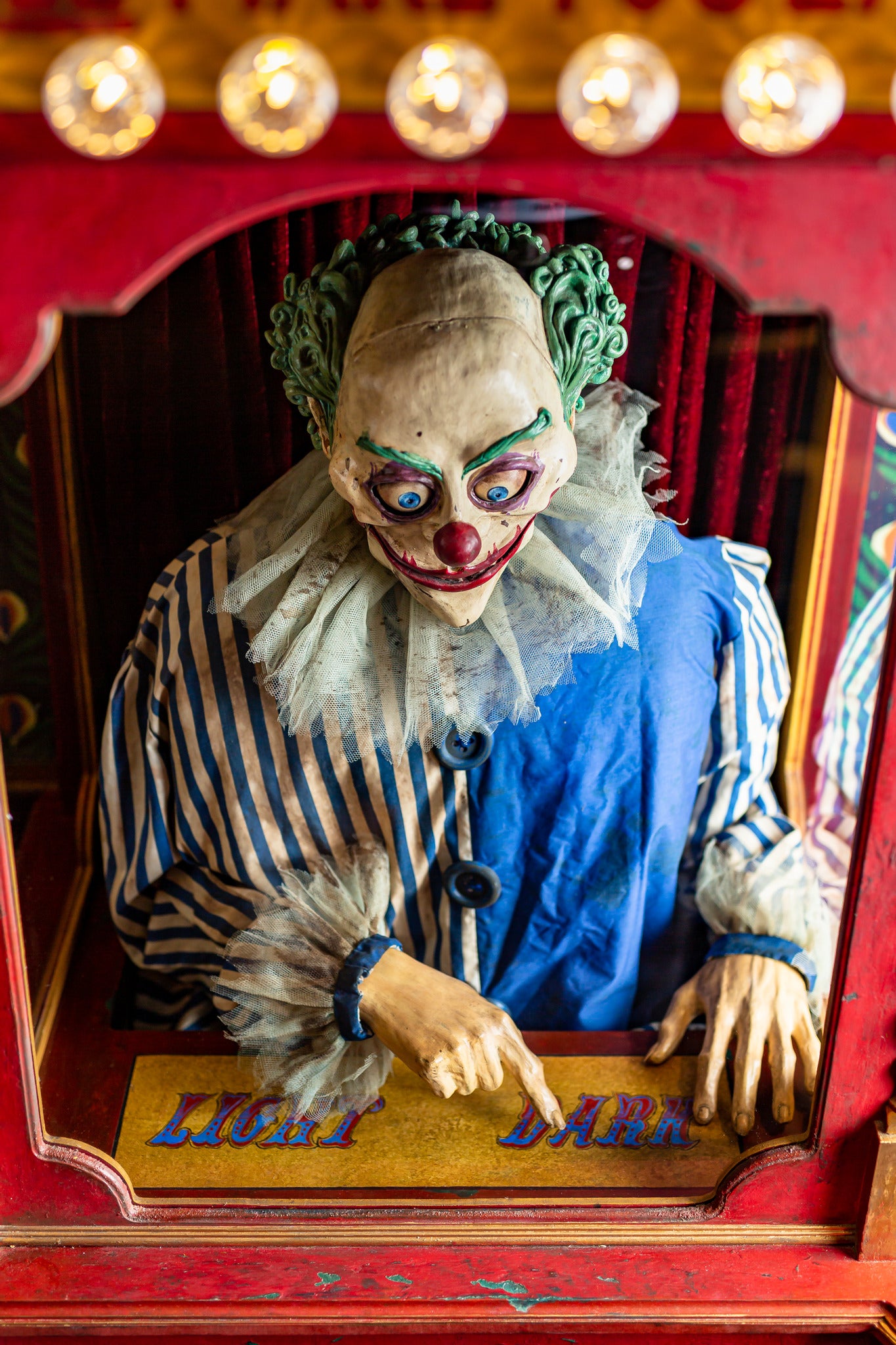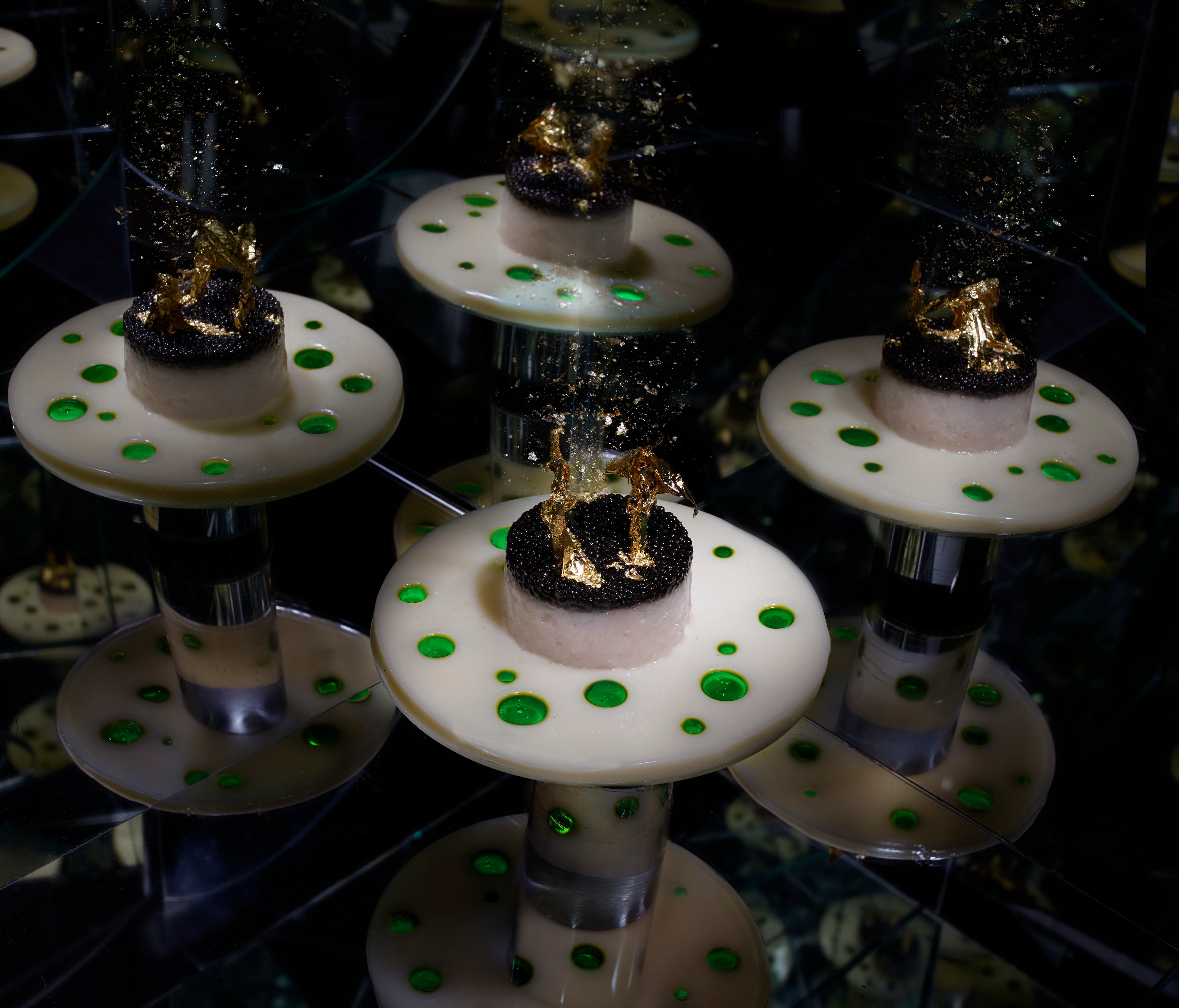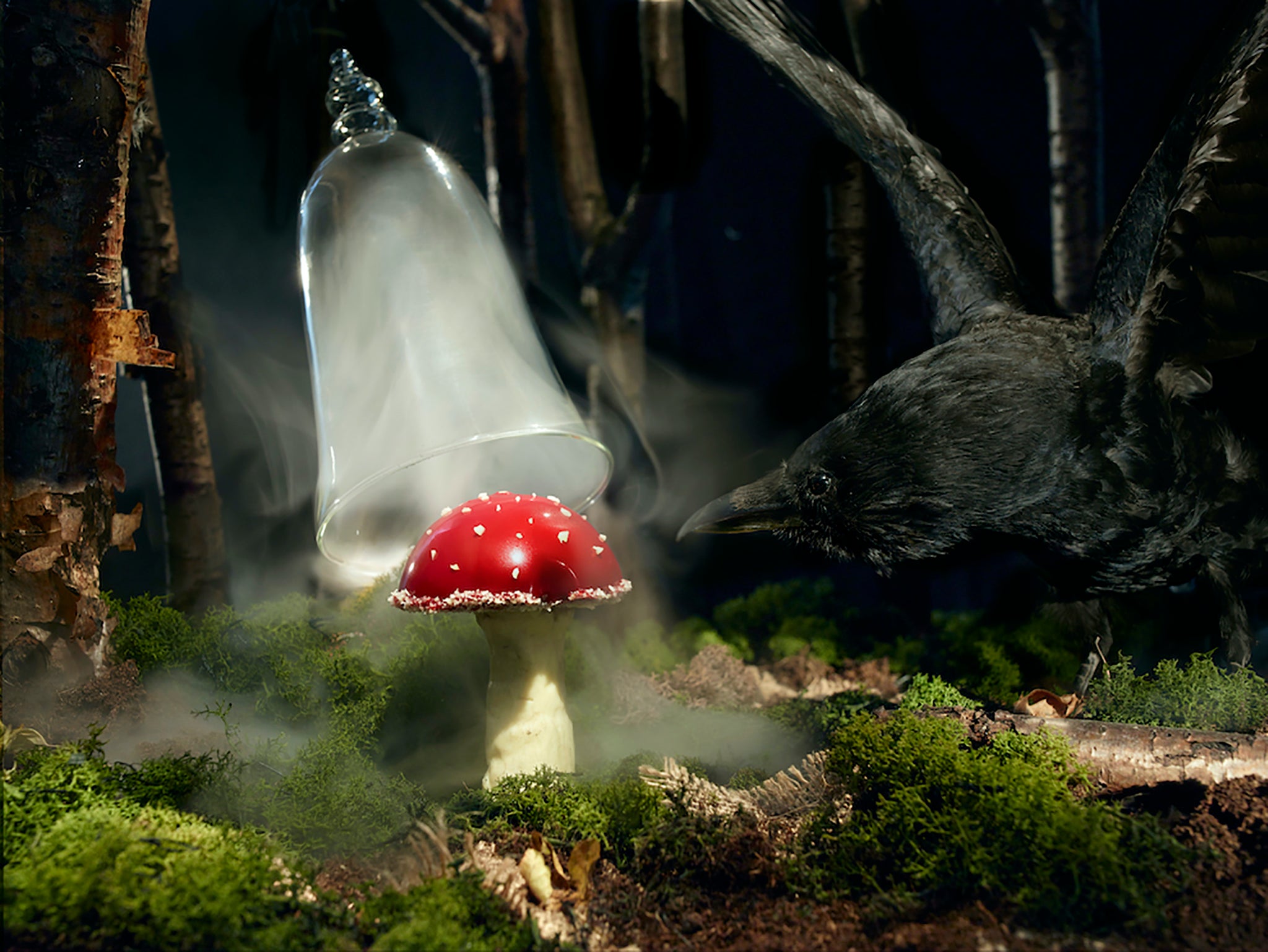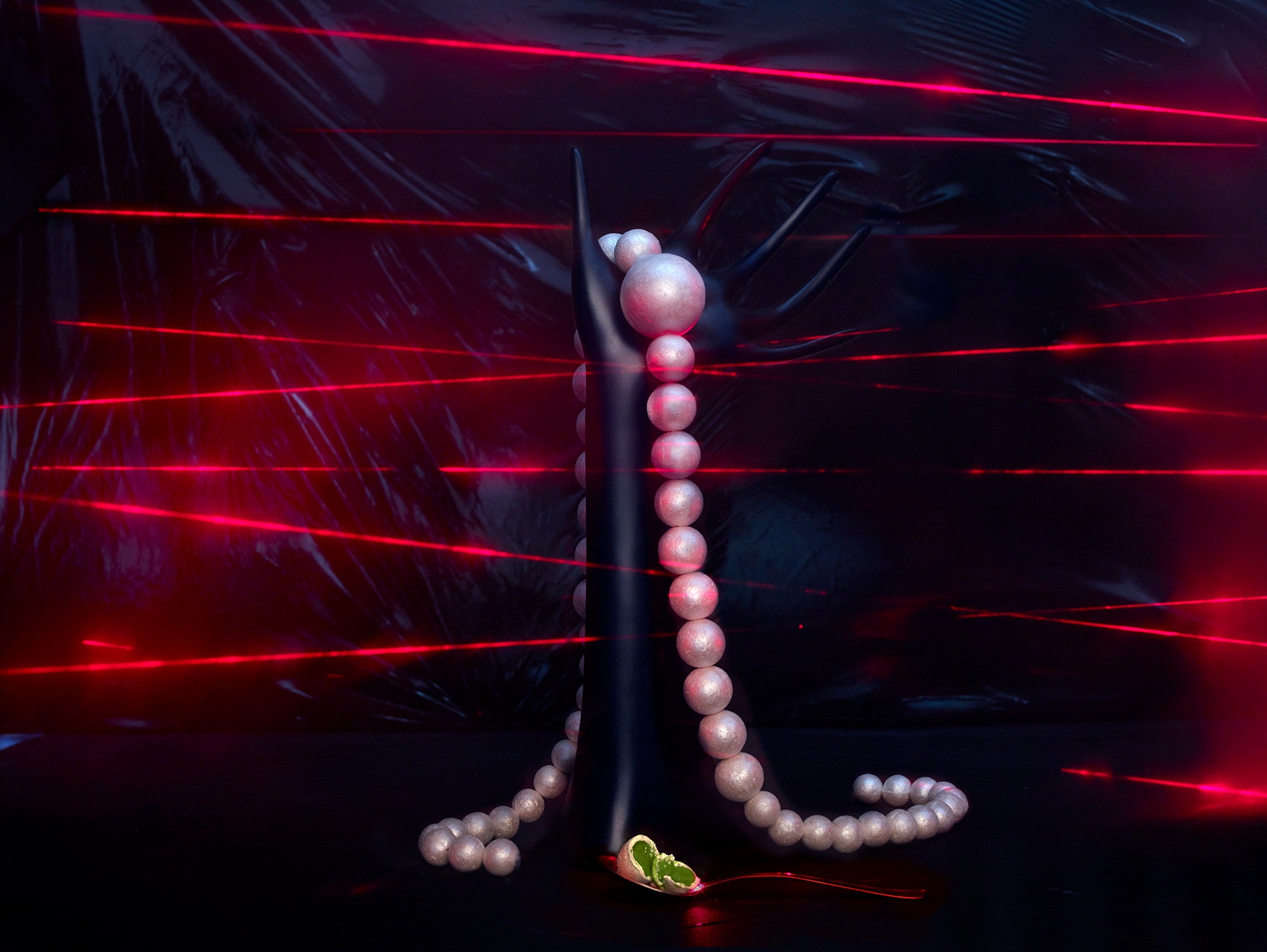
A handful of things typically happen when I book a restaurant, but brushing up on the DC universe isn’t usually one of them. Then again, there aren’t many multi-sensory experiences like the Monarch Theatre in Park Row, the smart Soho outfit dubbed, “the Batman restaurant”.
Actually, Park Row isn’t quite as gauche as all that. Although the inspiration for the food and decor comes from DC characters, the effects are subtle. Case in point: the dress code calls for Bruce Wayne rather than Batman, and Selina Kyle instead of Catwoman. And with a brigade of chefs in the kitchen who have worked in Michelin-starred restaurants, the food is taken seriously here.
Negotiating this fine balance between gimmicky and serious is James Bulmer, founder of innovation group Wonderland Restaurants. Bulmer’s no stranger to good food – his recently retired father Derek was the editor of Michelin’s Great Britain and Ireland Guide for the past 30 years. And, with stints at the Fat Duck and Disney under his belt, he knows a thing or two about creating theatre, too.
That theatre starts the moment I enter Park Row’s unassuming doors, behind which there’s a library instead of a restaurant lobby. And it’s only when I push past the faux bookshelves and descend the spiral staircase – dimly lit by pulsing strobe lights, Batcave-style – that I see the cavernous dining room itself.
Five restaurants and bars are squeezed into this enormous subterranean space, each with their own signature dishes and drinks. But Monarch Theatre, hidden behind a pair of heavy mirrored doors, sits at the very top of the hierarchy. It’s intimate, exclusive and designed to be a performance.

Before the show officially begins, all the guests are ushered into an ante room aptly decked out in green. Just for a moment, it feels like we’re being locked in an escape room, each of us scanning for clues. My eyes are instantly drawn to Chuckles the Clown, the fairground fortune teller surveying the room from an inconspicuous spot on the side. It’s this kitsch contraption that decides our fate in the first round – a light or dark cocktail to limber up before the show.
Chuckles’ scrawny index finger lands on dark for me and I get a peated whisky cocktail. It reminds me of a negroni, except it turns my tongue black. Like my soul, one might imagine.
Next, caddies of caramel meringues are offered round. With the help of a little liquid nitrogen, these produce a whiff of popcorn-flavoured smoke that escapes from my nostrils as they dissolve on my tongue. It’s the stuff of Instagrammers’ dreams.
Suitably limbered up, the doors to the “theatre” itself finally opens. Inside, a solid white, boardroom-style table with space for 20 swivel chairs dominates the room. It’s a slick operation: as soon as the last guest sits down, the lights start whirring, the music goes on and the floor-to-ceiling light projection switches from the Monarch Theatre billboard to garish green graffiti.
The show has begun.
Our narrator – a tall and slender woman dressed in a smart black outfit, punctuated by two distinguishing pins, one of a bunch of grapes and a second of an umbrella – explains that this opening act is inspired by the puzzle-obsessed Riddler. In front of each of us is a cryptex and, as she tells the story of our villain, the graffiti shuffles into the clues we need to solve it. As we each fiddle with the dials, the amuse-bouche – an ox tongue lollipop with tart hibiscus and a delicate “cornetto” filled with carabinero prawn and wasabi – arrives on a black and gold bust and is wolfed down without a second thought.
The next 10 acts work in a similar way. Each one is based around a DC character, with the light projections, sounds and the food changing to reflect their personality or storyline. At times, it feels like sensory overload, but more often than not it’s just a tasting menu made up of the sort of food that made Heston Blumenthal famous more than a decade ago.

The second act, for example, is a deliciously plump scallop, topped with a dollop of Oscietra caviar wrapped in shimmering gold leaf, that reflects the excesses of the Penguin. The Scarecrow is interpreted as a mushroom parfait in the shape of the fairytale-like but deadly fly agaric. A clarified tomato and cucumber gazpacho echoes Harley Quinn, while the disconcerting wink of the Joker is recreated using black cod, Jerusalem artichoke puree and a purple octopus tentacle.
Just like the theatre, we get a 15-minute interval. The break isn’t just for guests to make a collective dash for the loos, though. It’s also a chance for the staff to set up the room for chapter two.
A micro-forest of flora and fauna – an ode to Poison Ivy – is bisecting the table when we return, and some light foraging is needed for this course. Resting against the moss, ivy and ferns, I find a half shell of coconut. In it, a single sphere, its liquid centre filled with an elderflower, apple and lime concoction, sits atop a creamy coconut and blackcurrant base. Next to it, half a hollowed out dragon fruit serves up a melee of passion fruit and micro-herbs.
It’s apt that Mr Freeze, Poison Ivy’s partner in crime, comes next, but the frosty plate of teriyaki pork rib, smoked eel and frog’s leg feels underwhelming given the strong start. Catwoman’s course – Icelandic king crab and chilli served as a white chocolate pearl – is off balance too, with the spice utterly overpowering the delicate crab meat. Even Batman doesn’t quite stand up to scrutiny: the Black Knight’s Black Angus fillet is just the right shade of medium rare, but it’s marred by the tough crust of the truffled potato “rock”.

Fortunately, the desserts bring things back on track.
Wonder Woman comes to the rescue as a moreish chocolate delice, punctuated with crunchy macadamia nuts and salted caramel ice cream. And we get the two halves of Superman: a wedge of creamy Brillat-Savarin cheese topped with a thin layer of sauternes jelly, followed by a perfect rocher of raspberry sorbet.
At the end of a long meal, I usually enjoy a little coffee or mint tea – time to reflect on the food, and to finish conversations. But this is a show, so we’re ushered back into the green room instead, to meet the executive chef Karl O’Dell (you might recognise him from Great British Menu) who frankly looks as uncomfortable as the rest of us in this contrived scenario.
Still, it’s a chance to ask about the menu and I guess anything else pertinent. I find out that the Penguin’s scallop is in fact raw, but cured with a little citrus to give it its distinctive texture. And the menu will have changed to reflect the seasons by the time you read this, so I’m in no danger of dishing out all the spoilers.

At home, I finally sit down for some tea to reflect on the performance.
Monarch Theatre is one part gimmick and one part serious food – and together they make quite the gourmet combination. But like every tasting menu, and indeed every show, there are highs and lows. So the real question is, is it worth the time and money?
If you’re a globetrotting bon vivant always on the hunt for the next tasting menu, you won’t find innovation here. The food is good, but you’ll no doubt have enjoyed similar experiences elsewhere.
For me, the price is the real winner. At £195 a head for food, wine and service, it’s nudging the premium end of dining experiences, even in London.
But consider this: there are just a handful of restaurants like this around the world, most notably Shanghai’s Ultraviolet by Paul Pairet and Ibiza’s Sublimotion, with the former charging £400 for the basic experience and the latter upwards of £1,500 a head.
So Monarch Theatre? Quite a bargain in comparison.
Qin Xie was a guest of Monarch Theatre. There are currently shows every Tuesday to Saturday at 12pm and 7pm.







